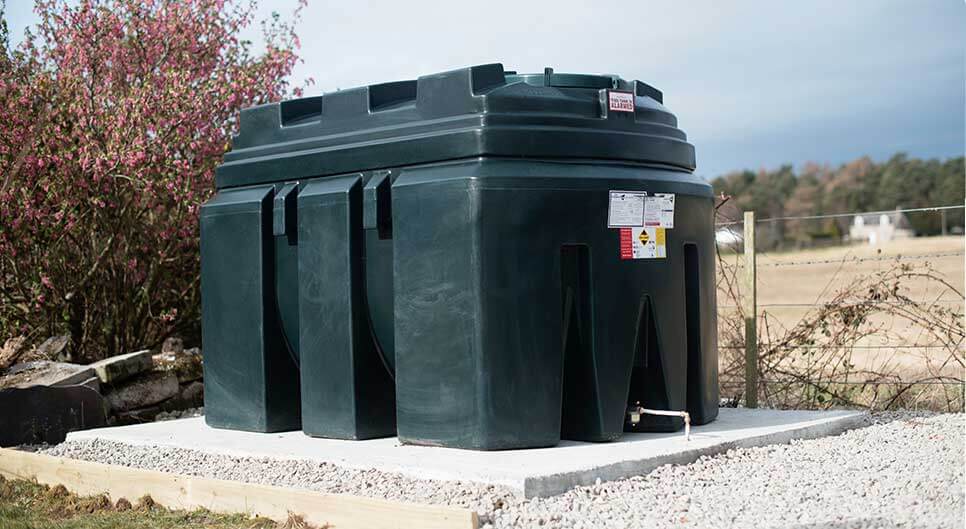What are the current oil tank regulations?
The oil tank regulations apply to any business or individual storing large quantities of oil. For businesses, this means an oil storage container with a capacity of over 200 litres. This includes schools, hospitals and leisure centres, as well as transport, haulage, logistics and construction. There are different rules for agriculture where fuel is used specifically for agricultural purposes such as powering a tractor or grain dryer. However, if a farm uses the fuel for lorries or other vehicles, they must comply with the oil storage regulations for businesses.
The regulations exist to minimise the risk of oil spillages, which can cause significant harm to the environment. Failure to adhere to the oil tank regulations can result in considerable fines or even prosecution.
Regulations vary across different regions, as well as being dependent on type and use of tank.
It is therefore recommended that you check with your local council for specific guidance.
Generally for any fuel dispensing tank, Certas Energy recommends following these regulations:
- ‘‘The Control of Oil Pollution (Oil Storage) (England) Regulations 2001’ the fuel dispensing hose must be within a locked cabinet and any drips contained within the bund.
- Wales: In line with the Oil Storage Regulations (OSR Wales), any above ground oil tank over 200 litres must have 110% secondary containment by April 2020. It aims to promote responsible management of oil storage to reduce the potential for negative effects on the environment and to prevent businesses receiving hefty fines.
Certas Energy steel tanks conform to these regulations:
BS799:5-2010 Type J and to recommendations made in ‘Oil Storage Regulations for Business’ (Environment Agency and Department for Environment, Food and Rural Affairs, England and Wales 2018) and GPP2 (Above Ground Oil Storage Tanks (Scotland and Northern Ireland).
Which fuels are included in the oil tank regulations?
The UK oil tank regulations cover a wide range of fuels and industries. If you or your business store any of the following fuels and oils in a capacity of over 200 litres, then the regulations must be adhered to.
- Petrol
- Diesel
- Biofuels
- Kerosene
- Vegetable oils
- Synthetic oils such as lubricants
- Liquid bitumen-based products e.g. damp proofing or road surface products
There are some exceptions where the regulations do not apply, such as:
- Oil stored underground
- Temporarily storing oil with the sole purpose of moving it onwards to another location
- Some waste oils (see government guidance for specific products)
- Oil used in agriculture for the production of heat and power
This list is not exhaustive and we would always recommend referring to government guidance for further clarity – read the detail here.
Why it’s important to store fuel correctly
The fuel tank regulations were developed to prevent the potential harm caused when oil is not stored or handled correctly. As well as risk of adverse effects on the environment, some fuels are highly flammable and therefore extremely dangerous if not handled and stored appropriately. Oil spills are cited as one of the most common forms of pollution and are harmful to trees, waterways and wildlife. Anyone responsible for the source of the oil spill will be liable for the clean up and the associated cost. Additionally, fuel is a serious fire hazard, and should any spills come into contact with an ignition source, the consequences could be devastating. Whilst a fire starting within a fuel tank itself is unlikely, it is still important to ensure the risk is minimised as much as possible, in order to protect the environment, businesses and individuals.
What kind of fuel storage tank do I need?
Selecting the right tank depends on several considerations, including:
1. Type of fuel to be stored
2. Whether the tank will be static or needs to be transportable
3. Budget
4. Timescale (how quickly is the tank needed)
Talk to our specialist tank team for expert advice
Other considerations for commercial fuel tanks
- Single vs Double Skin
- Bunded Tanks – all businesses must have bunded tanks or will face a fine
Commercial fuel tanks from Certas
Certas Energy tanks specialists are available to provide product and installation guidance to suit different applications and business requirements. This is in addition to offering a full range of fuel storage tanks, available with a variety of additional features to prevent theft and spills – all of which are fully compliant with the fuel storage regulations.
Clear and detailed tank specifications and pricing is available on request.
Static Plastic Gasoil/Derv/GTL HVO Tanks:
- 1,225 to 9,000 litre options
- Economical and quick lead time
- No installation required
- Integrally bunded
- 10 year warranty (tank no aux parts)
- From basic dispensers to ones with
Fuel Management Systems - Fuel monitoring options on request
Static Steel Gasoil/Derv/GTL/AdBlue®/HVO Tanks:
- 10,000 to 100,000 litre options
- Robust, anti-vandal proof
- Lifetime warranty if maintained and serviced regularly
- Basic dispensing or Fuel Management System options available
- Turnkey package – delivered ready for use
Transportable Plastic Gasoil/Derv/GTL HVO Tanks:
-
- 200 to 900 litre options
- Economical and quick lead time
- No ADR required to transport
- Easily manoeuvrable
- 10 year warranty (tank not aux parts)
Transportable Steel Gasoil/Derv/GTL HVO Tanks:
- 250 to 2000 litre options
- Robust and quick lead time
- With and without wheel options
Static Plastic AdBlue® Tanks:
-
- 2,500 to 9,000 litre options
- Economical and quick lead time
- No installation required
- Integrally bunded
- 10 year warranty (tank no aux parts)
- From basic dispensers to ones with Fuel Management Systems
- Fuel monitoring options on request
Static Stainless Steel Petrol Tanks:
- 1200 to 2950 litre option
- Choice of pumps – standard is handpump
- Gravity Fill
- ATEX rated for safety reasons
Looking after your fuel tank
As well as complying with oil tank regulations, regular maintenance will help ensure your fuel tank lasts longer and is less likely to need expensive repairs. In most cases, a fuel storage tank will last approximately 20 years. Steel tanks if maintained and serviced regularly can last a lifetime.
Inspect your fuel tank often for signs of wear and tear and act accordingly as soon as any compromise is noticed.
- Fuel filters need changing regularly – every 6 months on average to keep the pump working at the optimum flow rate. Certas sells a range of these. Just provide us with the filter number and we will quote you on supply.
- Fuel hoses – will need to be replaced when when they become brittle or start to leak. Certas sells these and can help with replacements.
- Fuel nozzles – when nozzles get damaged and start leaking they should be replaced. Certas sells, and can help with new fuel nozzles.
- Tank gauges – If the fuel gauge is faulty or broken our drivers are within their rights to refuse delivery for health and safety purposes. We can quote on gauge replacement.
- Missing or damaged lids – If a tank is without a lid or is damaged, this can lead to water ingress which can compromise the integrity of the tank. Certas can supply replacement lids for most common fuel tanks.
Official Sources
For more information you can read the Government website, Oftec guidance or Oil Storage Regulations for your area
Find out more about our fuel tanks
TAKE CONTROL OF YOUR FLEETS FUEL
Ready to start fuelling your business' success?
Steamline your fleet operations, control costs, and experience the benefits of Certas Energy Fuel Cards. Get in touch to start saving today.




